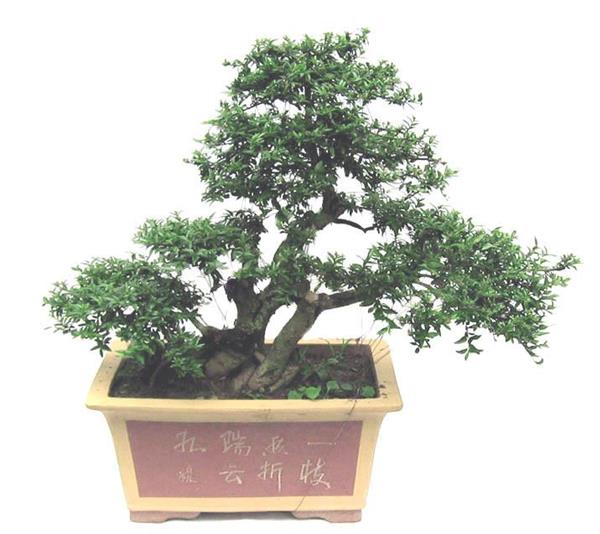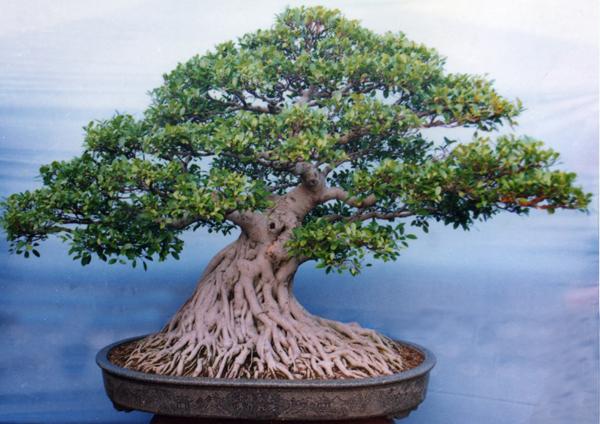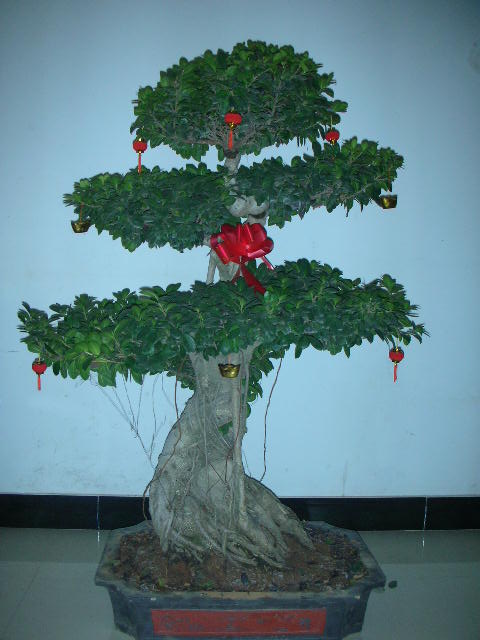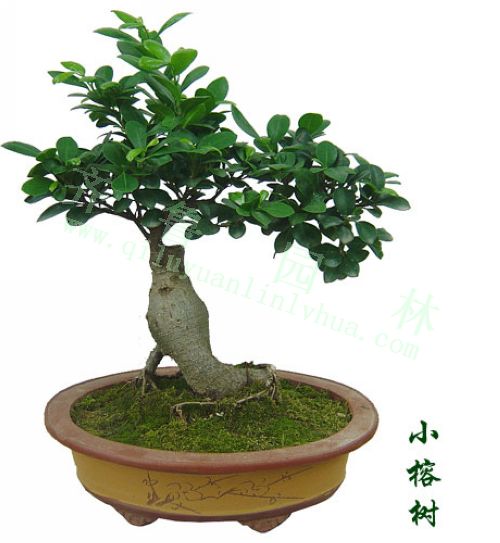[what if the leaves of the banyan tree fall] how to raise the banyan tree well
The banyan tree has green leaves, evergreen seasons, intertwined roots and ancient state, so it is an excellent indoor bonsai material. Small banyan bonsai can control its growth and development and cultivate it into a unique shape of banyan bonsai through pruning, pruning, hanging, grafting and other techniques. What if the leaves of the banyan tree fall off? How to raise the banyan tree?
What if the banyan leaves fall off?
1) lack of fertilizer.
Just put on some fat.

2) poor ventilation.
You can put it on the balcony for ventilation. Let it bask in the sun.
3) improper watering. It is caused by heavy water and waterlogging.
Because the damaged root system can not be recovered for a while, of course, the leaves will continue to fall. Later, pay attention to dry and pour thoroughly, let it recover slowly, don't be in a hurry, don't fertilize the root at this time.
4) rotten root
If there are yellow leaves, and the leaves fall. Then change the soil and get rid of the rotten roots.
5) there are pests
Please see if there are bugs (red, white, black) on the back of the leaves. Your banyan bonsai is likely to grow red spiders (too small to be seen, take a closer look), or the leaves are badly curled. If there is the above situation, it is recommended to buy pesticides at the place where flowers are sold (both in bags and bottles). Some people in the family smoke, leave cigarette butts and soak them in unused containers with a dozen cigarette butts (a little more water). After a day, bathe each leaf with soaking water (smoke water) (once a day). It will be all right after a while.

6) normal phenomenon (with premise)
When you first move home, you will lose leaves all the time for 2 months, but don't worry, the new leaves will also grow (very soon). Don't worry about moving around, just fix a place, and don't be afraid of watering more or less (if the soil is very dry, it will be a little more at a time). After 2 months, all the old leaves are replaced with new ones, that is, the leaves grow in your environment and will not fall off again. Will always grow up lush and lush.
Bonsai culture environment of small banyan trees:
Banyan tree is a southern tree species, this kind of bonsai is generally placed in a ventilated and transparent place, there is a certain space humidity, control temperature.
If you put it for indoor viewing, the time should not be too long, generally, it should be moved outdoors for recuperation in about 20 days; summer and autumn is the growing period, and the rotten cake fertilizer is applied once a month to keep the basin soil moist; if it is not too wet, you can often spray water on and around the leaves; increase the environmental humidity, do not expose yourself to the sun in summer, and when the winter temperature is about 5 ℃, move the indoor sunny warm place to keep warm to prevent freezing. The use of loose, water-permeable rotten leaf soil, the usual ratio is garden soil / saprophytic soil / sand: 2:2:1. The basin soil should be dry in winter.
Note: if the sun is not enough, ventilation is not smooth, there is no certain space humidity, can make the plant yellow, dry, leading to the occurrence of diseases and insect pests, until death.

Key points of cultivation and cultivation
Temperature: like a warm environment, the suitable temperature for growth is 20: 30X:. It is not very cold-resistant, a large number of fallen leaves will be produced when the air temperature is below 3TC, and the plants will die when the temperature is below 01C. The overwintering temperature should not be lower than 51C, and indoor cold protection should be provided in winter.
Light: like the sun, but also withstand half-yin, but it is best to give enough sunshine. Lack of light does not sound the tree potential, and the leaves will become thin noodles, or even pluck off. In particular, the variety of golden grid more need a sunny environment, the stronger the light, the brighter the golden leaves, when the light is insufficient, the leaves will turn green, so as to appreciate the value.
Watering: like the wet soil environment, although it can also withstand drought, but when the basin soil is dry, it is not conducive to plant growth. Adequate water supply should be provided during the growing period to keep the basin soil moist. But the basin soil should not be too wet, when the light is insufficient and the basin soil is too wet, it will cause a large number of fallen leaves. After the rain in the rainy season, check in time and pour the stagnant water out of the basin. Watering should be controlled during overwintering to keep the basin soil slightly dry.
Fertilization: like fertilizer, topdressing nitrogen, phosphorus and potassium fertilizer once a month. When there is insufficient fertilization and lack of fertilizer, the leaf margin will turn yellow and some of the leaves in the lower layer will fall off. Nitrogen fertilizer should not be more when applying fertilizer, otherwise it will cause branches and leaves to grow excessively and affect ornamental. The application of alum fertilizer and water during the growing period can make the foliage greenish but not yellowing. Stop fertilizing after October.
Pruning: pruning once in spring to cut off dense branches and short branches protruding from the crown in order to maintain good ventilation and light transmission inside the plant and maintain a good tree shape. The styling stump is cut off or cut short at any time during the whole growing period, which affects the flatness of the branches. In early summer, if all the leaves of the potted stump are removed, and the water is controlled and sufficient light is given, the new leaves will germinate and grow thick and small, thus increasing the appreciation value of the overflowing trees.

Turn the basin: because of the fast growth, the basin should be turned once a year in spring. The pot plant of li should not be large, otherwise it will easily lead to excessive growth of branches and leaves. Like acid soil, if the culture soil is alkaline, the leaves will be yellowed. The matrix can be prepared with rotten leaf soil, peat soil, f soil, perlite or coarse sand and other materials. Pest control: there are leaf spot disease, gray mold, coal pollution disease and shell insects, fig mother thrips and other diseases and insect pests.
Turn the basin: because of the fast growth, the basin should be turned once a year in spring. The pot plant of li should not be large, otherwise it will easily lead to excessive growth of branches and leaves. Like acid soil, if the culture soil is alkaline, the leaves will be yellowed. The matrix can be prepared with rotten leaf soil, peat soil, f soil, perlite or coarse sand and other materials. Pest control: there are leaf spot disease, gray mold, coal pollution disease and shell insects, fig mother thrips and other diseases and insect pests.
Related
- Wuhan Hospital Iron Tree Blooming Result Was Instantly Frightened by the Gardener Master
- Which variety of camellia is the most fragrant and best? Which one do you like best?
- What is the small blue coat, the breeding methods and matters needing attention of the succulent plant
- Dormancy time and maintenance management of succulent plants during dormancy
- Minas succulent how to raise, Minas succulent plant pictures
- What are the varieties of winter succulent plants
- How to raise succulent plants in twelve rolls? let's take a look at some experience of breeding twelve rolls.
- Attention should be paid to water control for succulent plants during dormant period (winter and summer)
- Watering experience of twelve rolls of succulent plants
- Techniques for fertilizing succulent plants. An article will let you know how to fertilize succulent plants.



